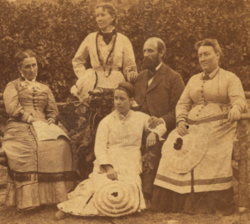| Apostolic United Brethren | |
|---|---|
 The AUB headquarters in the Wasatch Range | |
| Abbreviation | AUB |
| Classification | Restorationist |
| Orientation | Latter Day Saint movement |
| Theology | Mormon fundamentalism |
| Polity | Hierarchical |
| President of the Priesthood | David Watson[citation needed] |
| Region | North America |
| Headquarters | Bluffdale, Utah, U.S. |
| Founder | Lorin C. Woolley (1929) |
| Origin | April 6, 1830 (officially given) March 6, 1929 (as Woolley Group); 1975 (incorporated) |
| Separated from | Council of Friends |
| Members | 10,000+ |
| Mormonism and polygamy |
|---|
 |
|
|
This article needs additional citations for verification. (March 2024) |
The Apostolic United Brethren (AUB) is a Mormon fundamentalist group that practices polygamy. The AUB has had a temple in Mexico since at least the 1990s, an endowment house in Utah since the early 1980s, and several other locations of worship to accommodate their members in the US states of Wyoming, Arizona, and Montana.
The title "Apostolic United Brethren" is not generally used by members, who prefer to call it "The Work," "The Priesthood," or "The Group." Those outside the faith sometimes refer to it as the "Allred Group" because two of its presidents shared that surname. Members of the AUB do not refer to their organization as a "church" and, unlike nearly all other Mormon fundamentalist groups, regard the Church of Jesus Christ of Latter-day Saints (LDS Church) as a legitimate, if wayward and diminished, divine institution.
Religious scholar J. Gordon Melton characterised the group as "the more liberal branch of the Fundamentalist movement", as the group allows sexual relations apart from the strict purpose of procreation.[1]
The group came into the Hollywood spotlight with the release of the hit reality TV series Sister Wives aired in 2010.
The AUB furnished a detailed description of their beliefs and practices in August 2009 to the Utah Attorney General's "Polygamy Primer,"[2] which was later revised in 2011.[3] This booklet is used to educate the law enforcement and social relief agencies involved with similar groups.
The AUB is unrelated to other similarly named groups such as Churches of the Brethren and Apostolic Pentecostals.
- ^ Melton, J. Gordon (1992). Encyclopedic Handbook of Cults in America. New York: Garland. p. 51.
- ^ Utah Attorney General's Office and Arizona Attorney General's Office (August 2009), The Primer: A Guidebook for Law Enforcement and Human Services Agencies Who Offer Assistance to Fundamentalist Mormon Families (PDF), archived from the original (PDF) on 2009-08-20
- ^ Utah Attorney General's Office and Arizona Attorney General's Office (January 2011), The Primer: A Guidebook for Law Enforcement and Human Services Agencies Who Offer Assistance to Fundamentalist Mormon Families (PDF), archived from the original (PDF) on 2013-10-16, retrieved 2014-01-14